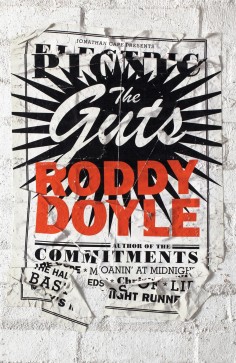
E- and audiobook reviews: fiction
Audiobook might just be the perfect medium for Roddy Doyle's The Guts. A sequel to The Commitments, which was filmed exuberantly by Alan Parker, the narrative is dominated by invective-filled conversation and internal monologue.
Audiobook might just be the perfect medium for Roddy Doyle's . A sequel to , which was filmed exuberantly by Alan Parker, the narrative is dominated by invective-filled conversation and internal monologue. Part one starred the charming chancer Jimmy Rabbitte who formed a soul band in Dublin comprising similar deadbeats. has a slightly less raucous, if no less hilarious plot. Rabbitte is now 47, married with children and just about confronting a diagnosis of bowel cancer. He fears he may be dying, but can't quite summon the energy to change his life. He reconvenes with Imelda Quirk, the heartthrob from , and reconciles with his brother. Laurence Kinlan brings out Doyle's street poetry with aplomb, tearing through the banter between Rabbitte and his dad, the baroque musings inside his head, and the touching family scenes. Doyle writes brilliantly about music and music fanatics. The concluding rock festival is a pure delight.
Arthur Ransome's classic of children's literature is now more than 80 years old. Despite some inevitable wear and tear - no iPods, mobile phones or internet - the 12-book series hasn't really aged a day. The Swallows are John, Susan, Titty (yes, Titty) and Roger Walker. The Amazons are Nancy and Peggy Blackett, aided and abetted by Captain Flint (or their misanthropic uncle, Jim Turner). The story doesn't run on a plot so much as a series of adventures on boats and in tents. What action there is explains how the two families, enemies at first, come together after Captain Flint accuses the Walkers of making off with his memoirs. The joy is in living a version of childhood that feels familiar, even if you never practised infantile piracy in the Lake District. Gareth Armstrong's earthy, mild rumble of a voice catches the nostalgia for holidays, vacation friendships, and even a vision of England that was already out of date. But that is the power of this wonderful book.
Clay Jannon, the narrator of , is a technophile who confesses that for many years he "rarely touched paper". Having lost his job at NewBagel (two ex-Googlers make the perfect "platonic bagel"), he finds work at Mr Penumbra's bookstore. Its very tall bookshelves are filled by "Waybacklist": ancient, rare books that can only be borrowed not owned. The shop's methods are pleasingly antiquated. Each transaction is logged by hand in a ledger, along with details of the customers themselves - their appearance, background and emotions. Intrigued, Clay gathers his highest-tech friends to scan the texts and try to decode their grander narrative. The clash of written word is arresting, charming and thought-provoking (the novel began as a 6,000 word e-book), without ever quite going anywhere. Novels are codes, of sorts, but are codes novels?




